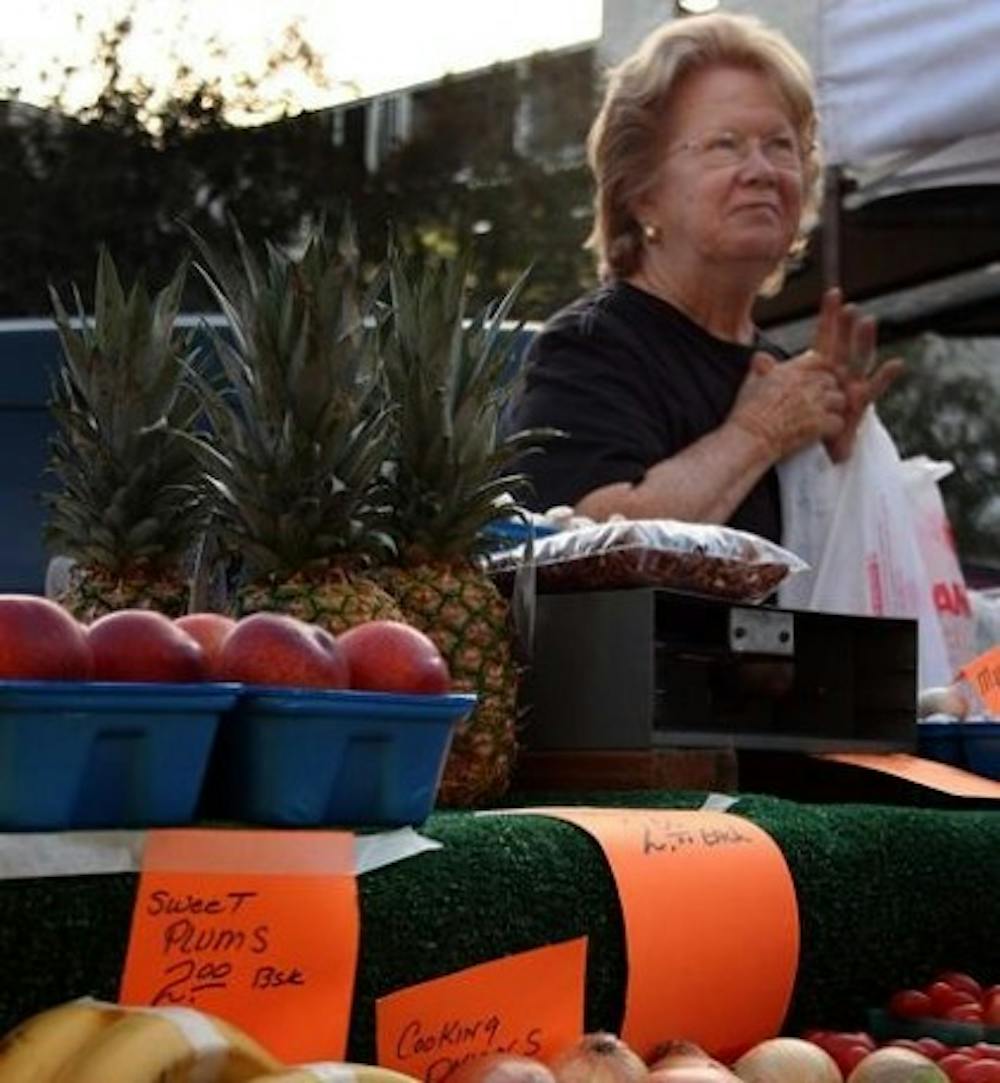Food from the local farmers market may not always be "Fresh from Florida."
As the economy continues to sink, more vendors at the downtown Union Street Farmers' Market are reselling produce bought elsewhere to stay afloat, and some farmers say it's becoming a problem.
"The main selling point of the farmers market is to buy fresh and local," said vendor Leo Polopolus, of Arcadian Farms in High Springs.
Before the weekly market started at 4 p.m. Wednesday, Polopolus readied his stand. Wooden baskets brimming with pecans - cracked, whole and shelled - sat next to homegrown, orange persimmons, bruised from picking and handling.
Polopolus, a retired UF agriculture economics professor, said resellers - known in the market as "pinhookers" - are crowding the local scene with produce they've purchased wholesale.
Items like apples, asparagus and plums are likely to be non-native crops, he said.
"Fresh apples from Gainesville? From Alachua County?" he said while arranging his fresh-picked persimmons. "No."
The growing number of resellers hasn't prevented customers from seeking out fresh, local produce.
Farmers market customers Jennifer and Michael Ramey, of Gainesville, simply won't buy produce if it's not local.
"I like to support local farmers," Jennifer Ramey said.
Another customer, Gainesville resident Frances Lane, said she comes to the market to get "farmer-grown stuff."
"I can just go to the grocery store for any of the resold produce," Lane said.
Charlie Lybrand, the co-founder of the Union Street Farmers' Market, said while the market is primarily a grower's market, there aren't many rules to stop someone from selling produce from other farmers.
Vendors who resell produce have to get prior permission from a market organizer and must put up signs to indicate the items are not their own, Lybrand said. The produce can never be from out of state, he said.
Vendor Rose Mercado said she's never been told to put up signs or that out-of-state fruit was prohibited.
Standing near bagged tangerines and potted orchids from her property in South Florida, Mercado displayed apples from Pennsylvania, pre-packaged purple grapes from California and Wisconsin organic cranberries, still in a clear plastic container with a barcode sticker on top.
She said she offers the organic cranberries because they're a hard-to-find item, and customers want them.
She isn't the only vendor to try to meet customer demand by offering a different selection than others.
Ed Kell, of Willow Acres Farm, said other vendors bring in hundreds of items customers won't buy, such as cabbage and lettuce.
Kell, who worked his stand with his wife, Sue, said to make money, he sells "filler items," such as bananas, avocados, apples, plums and pineapples, in addition to other crops harvested from his farm. He isn't sure where some of the items come from.
"Oh, the pineapples are from somewhere overseas," he explained. "And the bananas? Who knows? I know they aren't from Florida," he said with a laugh.
Kell said the leaf vegetables sold by many other farmers just don't make a lot of money.
Co-founder Lybrand said he's only received one complaint about resellers.
"We'll deal with the complaint as time rolls on," he said. "It's something we'll nip in the bud."
Market vendor Marvin Graham, who sells seasonal fruits and vegetables harvested from his farm in Brooker, Fla., said the increasing number of resellers is an "unspoken issue."
"No one's going to complain because they don't want to be put out (of the market)," Graham said.
He said other vendors take issue when resellers calling themselves farmers.
"And if people are able to lie to make a buck, that's on them," he said.
Long-time market vendor Marion Holder, of Hawthorne, said he's heard two or three vendors "grumble a little bit." But he said a market run without exceptions is hard to find.
Holder and his wife, Betty, sold citrus and handmade wooden stools beneath a white tent. He said other markets in the area used to have an inspector come by and check whether wares were homegrown.
Back then, the rules were stricter, he said. He wasn't even allowed to sell his small wooden stools because they didn't sprout up on their own.
"I like the idea of having to grow your own stuff," he said. "But I can see why some people want to carry produce others don't have.






